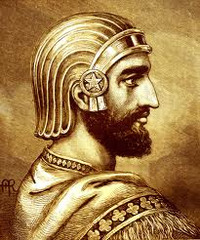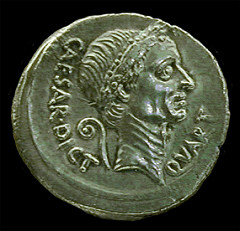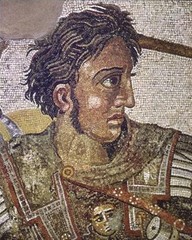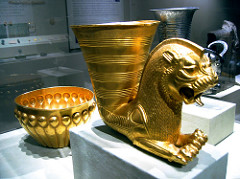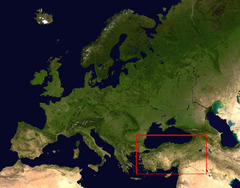Iran
Since the Revolution of 1979, Iran has been ruled by a complex governmental structure. At the top is the Supreme Leader, selected by the Assembly of Experts, who is Commander-in-Chief of the military and oversees the civilian government.The Islamic Republic of Iran, formerly known to outsiders as Persia, is one of the centers of ancient human civilization. The name Iran comes from the word Aryanam, meaning "Land of the Aryans." Capital: Tehran
Cyrus, Darius
Cyrus II of Persia, commonly known as Cyrus the Great and also called Cyrus the Elder by the Greeks, was the founder of the Achaemenid Empire 600 or 576 - 530 BC.
Parthians
The Parthian Empire was the result of the Roman destruction of the power of the Seleucids in the early 2nd century BC. When Rome defeated the Seleucids and became the masters of the Eastern Mediterranean they emerged a power vacuum in Central Asia without the Seleucids or Romans, leading to the emergence of a local regional power, the Parthians.
Bactria
Bactria was a province of the Persian empire located in modern Afghanistan, Uzbekistan, and Tajikistan.
empire
An empire is a political construct in which one state dominates over another state, or a series of states.
Indus River
The ruins of two ancient cities, Harappa and Mohenjo-Daro (both in modern-day Pakistan), and the remnants of many other settlements, have revealed great clues to this mystery. Harappa was, in fact, such a rich discovery that the Indus Valley Civilization is also called the Harappan civilization.
Persepolis
Persepolis is the Greek name for the ancient city of Parsa, located seventy miles northeast of Shiraz in present-day Iran. The name Parsa meant 'City of The Persians' and construction began at the site in 518 BCE under the rule of King Darius the Great
tribute
a gift, testimonial, compliment, or the like, given as due or in acknowledgment of gratitude or esteem.
standardized coins
Coins were introduced as a method of payment around the 6th or 5th century BCE. The invention of coins is still shrouded in mystery
qanat
In the early part of the first millennium B.C., Persians started constructing elaborate tunnel systems called qanats for extracting groundwater in the dry mountain basins of present-day Iran.
Alexander of Macedonia
Macedonian king Alexander the Great (356-323 B.C.) was born to parents King Philip II and Queen Olympia. died at 18
free and unfree labor
free classes which contained bulk of persian society received income that temples made from agriculture processes; slaves worked as domestic servants or skilled laborers in households of wealthy and on constrution projects
magi
Magi is a term used since at least the 6th century BCE, to describe followers of Zoroastrianism.
Achaemenids
Dynasty ruling in Persia from Cyrus I to Darius III (553-330 BC).
Seleucids
Persian empire from 323 B.C.E. until 83 B.C.E created by Seleucus after the death of Alexander the Great.
Anatolia
The peninsula between the Mediterranean and the Black Seas that is now occupied by most of Turkey; also called Asia Minor
Afghanistan
a mountainous landlocked country in central Asia
Macedonia
The ancient kingdom of Philip II and Alexander the Great in the southeastern Balkans that is now divided among modern Macedonia and Greece and Bulgaria
Thrace
a region and ancient country and wine producing region in the east of the Balkan Peninsula north of the Aegean Sea
satrapies
the 20 states into which Darius divided the Persian Empire
Royal Road
A road built by the ancient Persian ruler Darius for the government use which helped unite the empire
"eyes and ears of the king"
Military officers and tax collectors, spied on the satraps
Xerxes
son of Darius; became Persian king. He vowed revenge on the Athenians. He invaded Greece with 180,000 troops in 480 B.C.
bureaucrats
Workers and administrators who did specific tasks for the government
Zoroastrianism
Dual gods of equal power to form early monotheism; Persian; cosmic struggle over good and bad; those that do good go to heaven and bad go to hell, this influenced Judaism and Christianity
